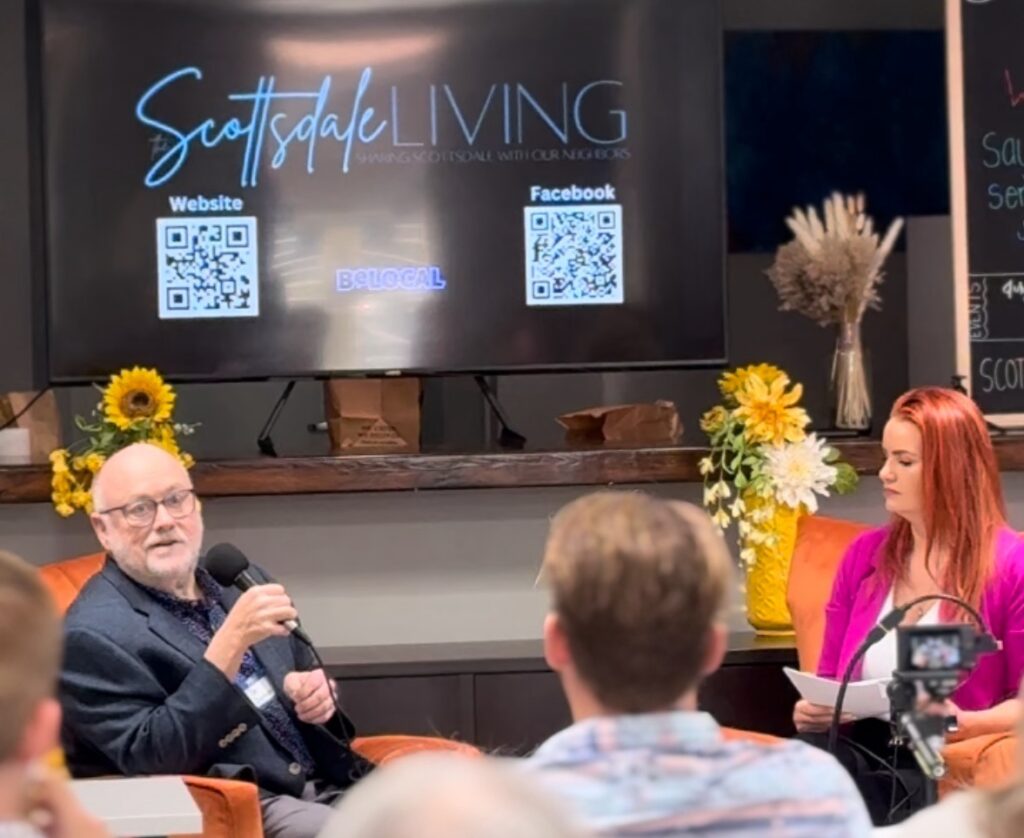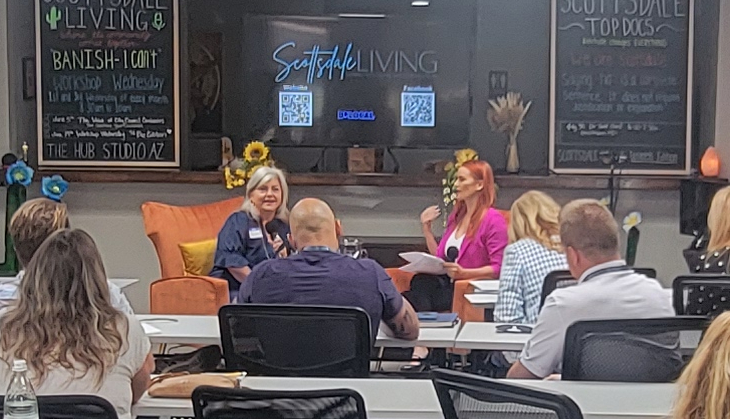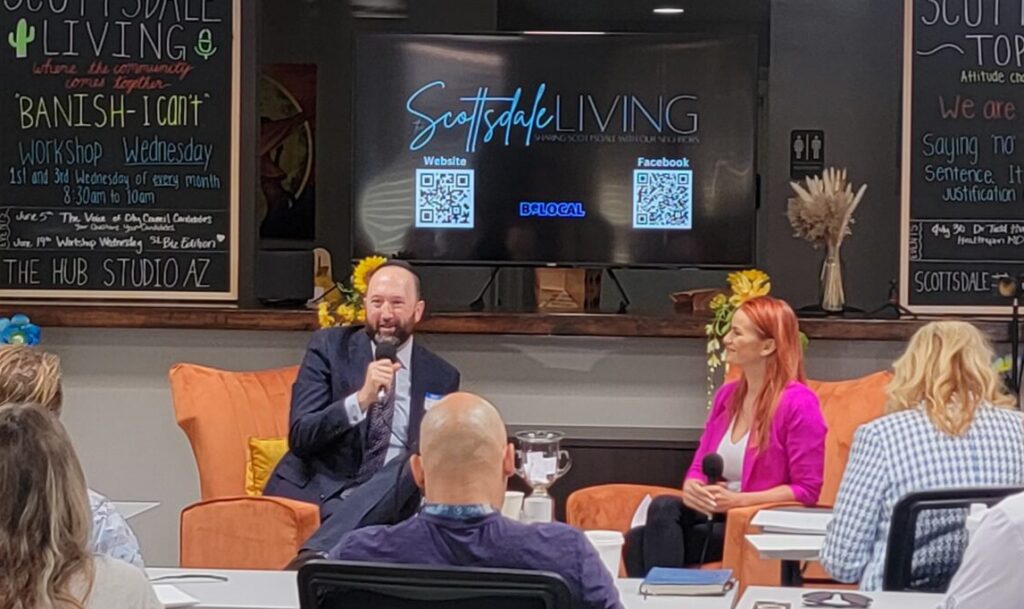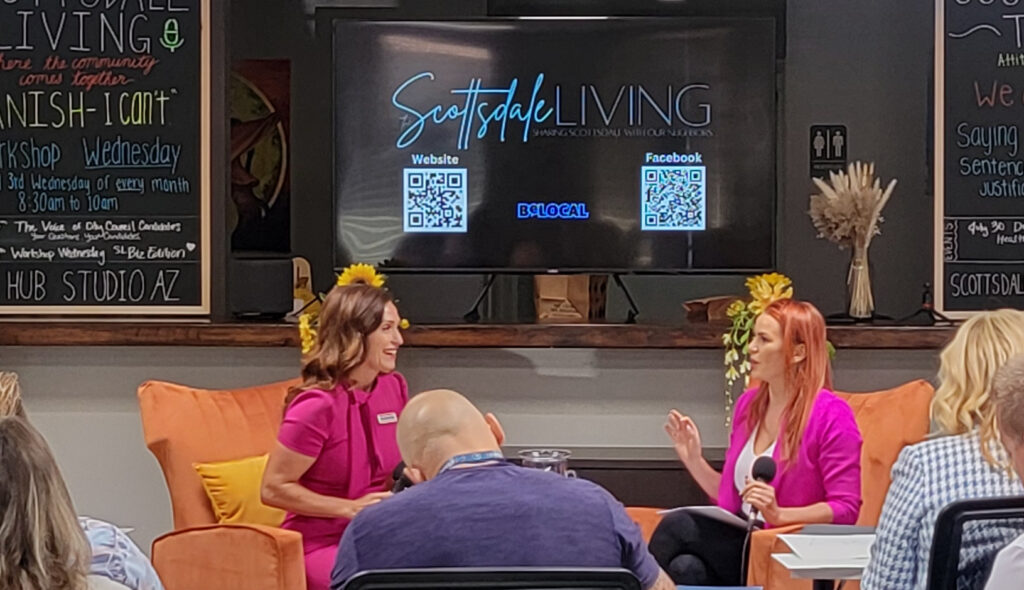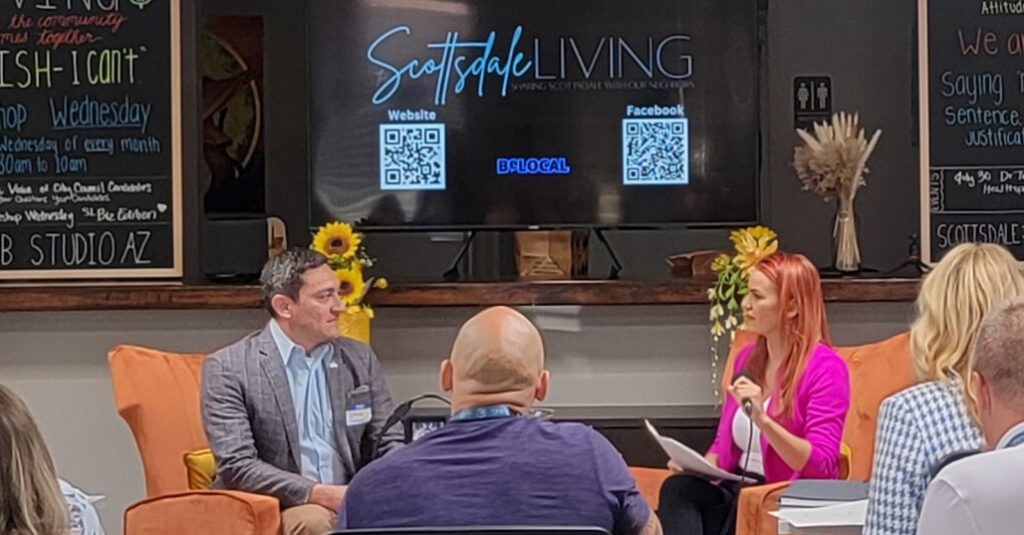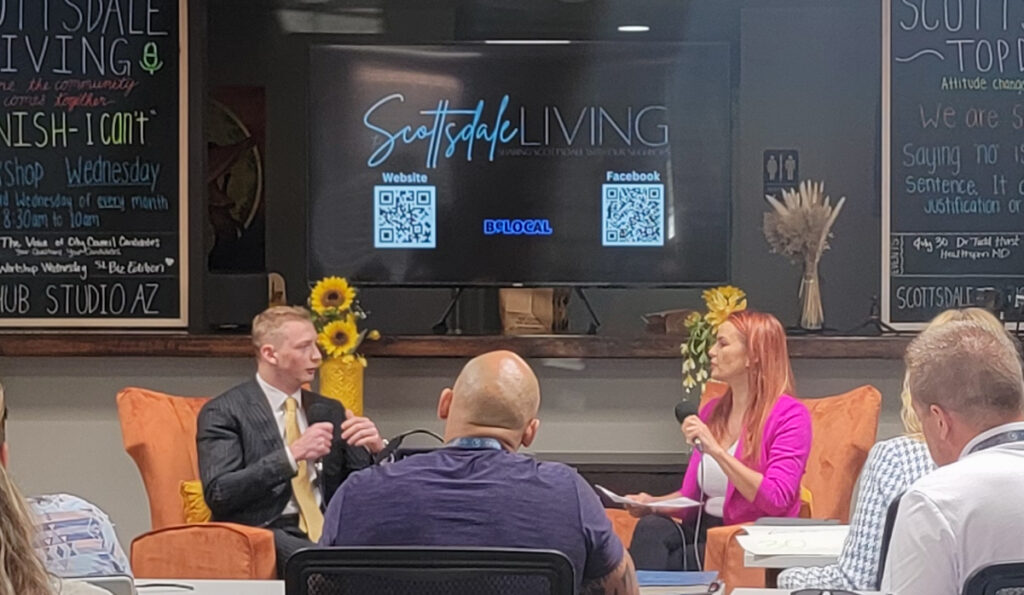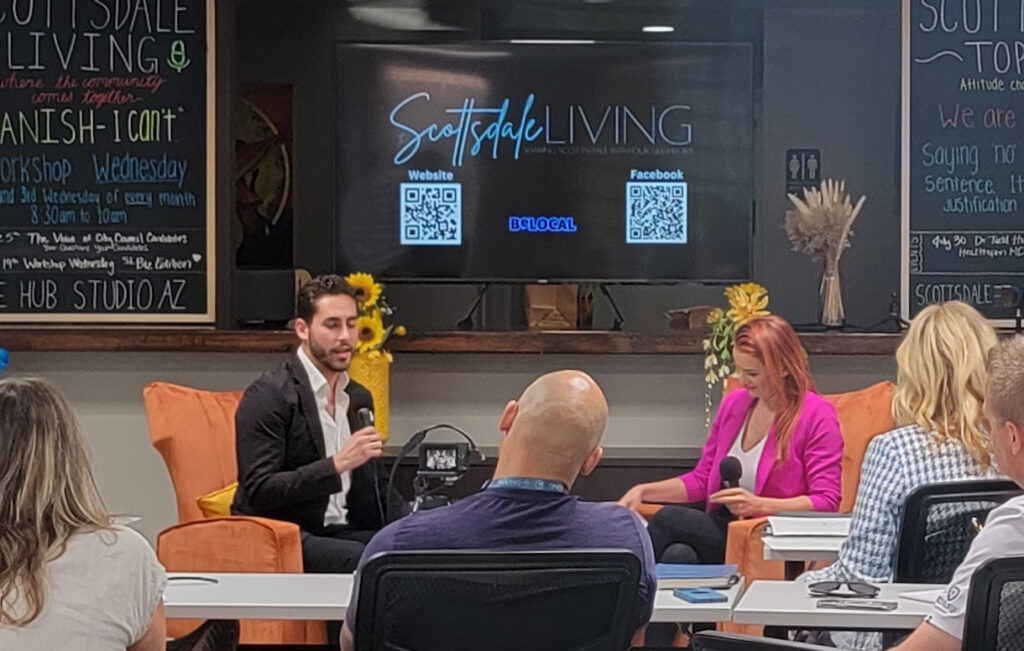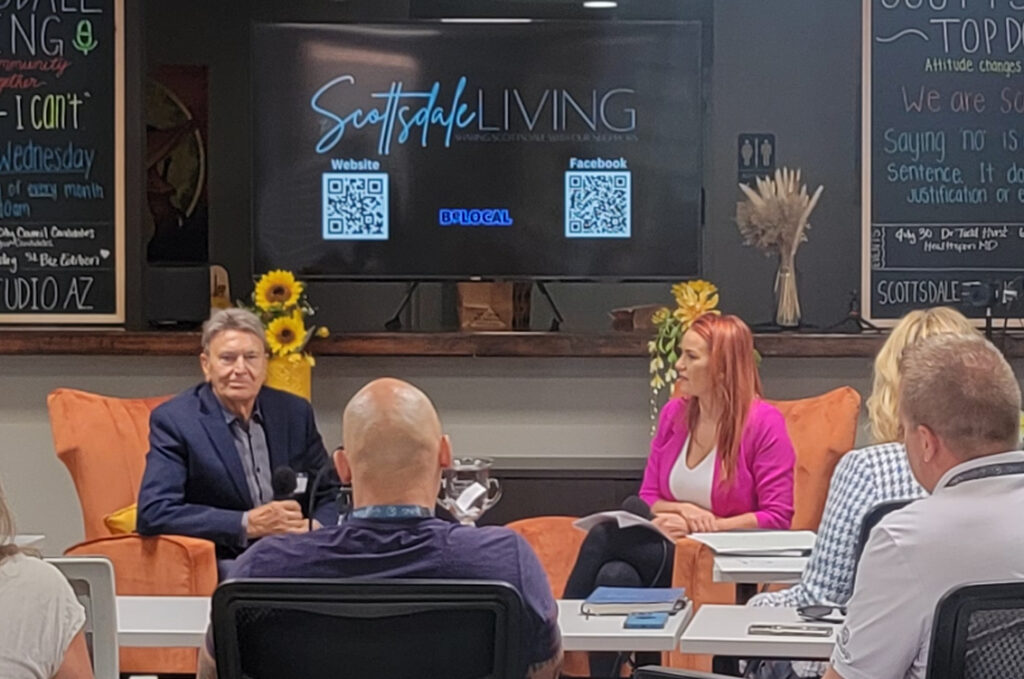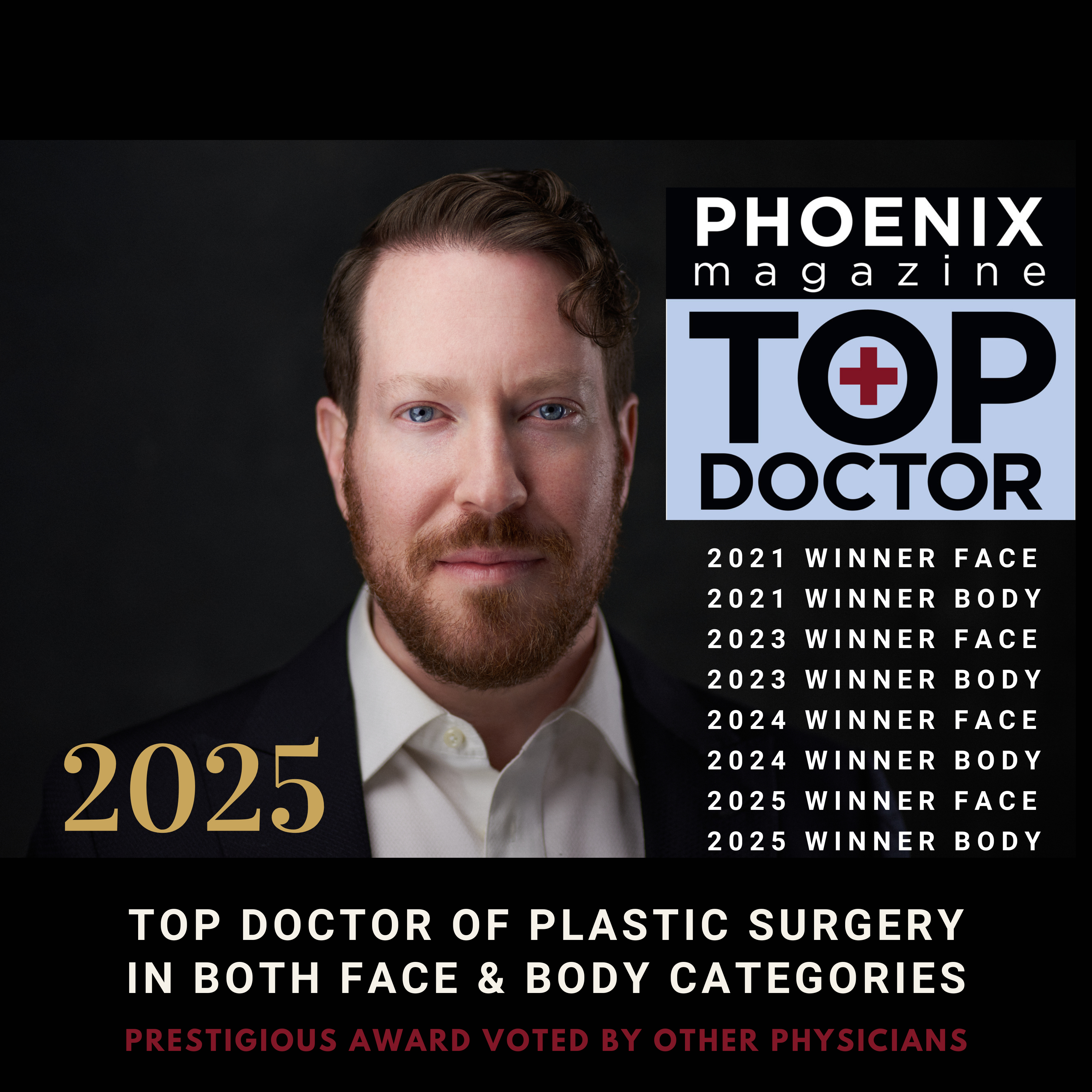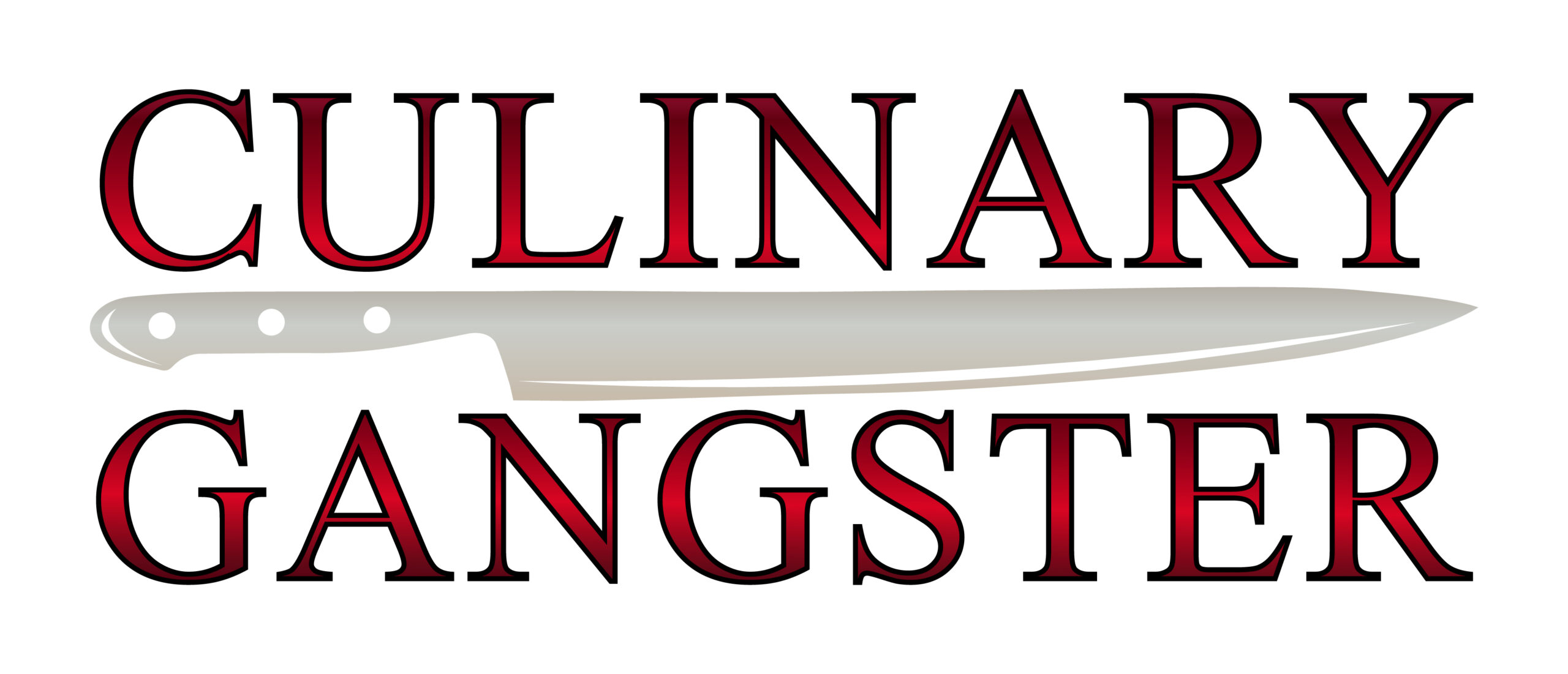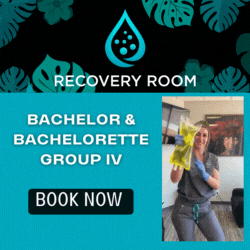Scottsdale City Council Candidates Address Key Issues at Scottsdale Living Business Edition Meeting
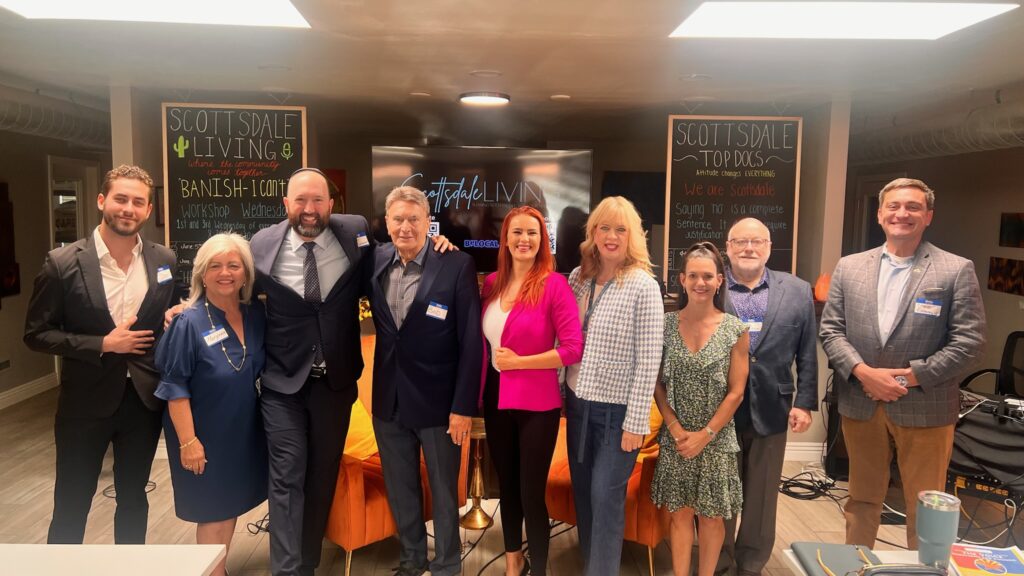
This morning, the Scottsdale Living Business Edition hosted an insightful forum featuring all nine candidates running for Scottsdale City Council. The event, live-streamed on the Scottsdale Living – “The Voice” podcast, provided a platform for each candidate to introduce themselves and address crucial questions affecting our community. Moderated by Amber Enright, co-founder of Scottsdale Living Business Edition, co-host of the podcast, and owner of The Therapy Doctor, PLLC, the event offered a unique opportunity for candidates to share their visions and answer questions directly from the community. Each candidate had a two-minute introduction followed by four minutes to respond to two or three randomly drawn questions from a total of eight prepared by the hosts. This engaging format ensured a diverse range of topics were covered, giving voters a comprehensive view of where each candidate stands.
To learn more about each candidate, just click the image to link directly to their site.
Find A Candidate:
(Speaking Order)
Tammy Caputi, a current member of the Scottsdale City Council, introduced herself by highlighting her active community involvement. “Good morning, I’m Tammy Caputi. I run my own small business, run my three children to activities, run marathons, and ran for city council to be a positive, forward-thinking, balanced voice for Scottsdale.”
Caputi described Scottsdale as an “aspirational city” with a “winning formula” of “high amenities, open space, strong property values, and low property taxes,” sustained by a vibrant economy. “The city of Scottsdale works on business activity, not bedroom activity, and it’s my job not to mess that up,” she said.
Reflecting on her tenure, Caputi noted achievements like keeping the budget in the black through a global pandemic, fully funding the police department, increasing high-paying jobs by 10%, managing short-term rentals, and passing a 10-year general plan with community benefits like open space and workforce housing for first responders.
She concluded with a commitment to ensuring Scottsdale remains a top-tier city for all residents and future generations.
Question: Homelessness along with panhandling has become a bit of an issue in Scottsdale in recent years. How do you propose to address this if elected to City Council in Scottsdale? Also, address the bridge housing plan as it exists today and your insight on it.
Tammy Caputi addressed the issue of homelessness by highlighting the current situation and the steps already taken by the city. “We recently did a point-in-time count and found 89 unhoused individuals in Scottsdale,” she noted, emphasizing that while any number is too many, it is not an overwhelming problem.
Caputi described the city’s approach, which involves partnering with organizations capable of addressing homelessness. “We offer daytime refuge to help people get reconnected to the community, conduct outreach and navigation in libraries and through our police department, and have an emergency housing program,” she explained.
She also highlighted the success of the emergency bridge housing program, which has an “84% efficacy rate” and primarily serves elderly residents and families with young children in Scottsdale. Caputi stressed that the program aims to prevent homelessness and includes requirements like drug testing and having a last address in Scottsdale. She clarified, “The program was never intended to serve people from outside Scottsdale or those here illegally,” addressing misconceptions and the politicization of the program.
Caputi concluded by acknowledging the progress made and the ongoing efforts needed to reduce homelessness in Scottsdale, stating, “While we’ve made significant progress, there’s always more work to do until we reach zero homelessness.”
Question: There seems to have been an uptick in crime in Scottsdale recently. From “tourism burglaries” to altercations with Scottsdale Police. What is your stance on crime in Scottsdale and what do you plan to do if elected to City Council?
Tammy Caputi addressed concerns about crime by emphasizing that Scottsdale’s crime rates are at a historic low and have been trending down since 2020. “When you have a high-profile case like the international crime ring, it underscores how safe our community is because of the little amount of crime here,” she explained, noting that incidents like these draw attention precisely because they are rare.
Caputi highlighted the city’s proactive measures in maintaining safety, including the creation of a real-time crime lab and the constant communication between the council and the police department. “We fully fund our Police Department with whatever they need. I’ve done it in the last four years, and I will continue to do it,” she stated, adding that she is endorsed by both police and fire departments.
She also mentioned ongoing projects to support public safety, such as renovating a new training facility for police and fire departments. Caputi emphasized the strong relationship between the council and the police, describing it as “an enviable situation in which we’re all very supportive of public safety.”
Caputi concluded by expressing her commitment to maintaining Scottsdale’s safety and continuing the positive relationship with the police department if re-elected, ensuring that the city remains “the gold standard for today and into tomorrow.”
Tom Durham, originally from the Midwest, shared his journey to Scottsdale, highlighting how he fell in love with the city upon retiring. “Well, my story about how I came to Scottsdale I think it’s always very interesting. I was a trustee of a small college in Iowa, and in 2013, we had our winter meeting [here].” He and his wife spent the long weekend falling in love with Scottsdale. “Within a couple of months, we had a contract to build a house, and as soon as I retired in 2015, we came here.”
Durham, a lawyer in Chicago for 35 years specializing in tax controversies, believes his legal background is beneficial for the city council. “Being a lawyer on the city council helps me understand contracts and some of the legal issues we face.”
In addition to his professional experience, Durham has been actively involved in the community as a mock trial coach at Sandra Day O’Connor High School for nearly 10 years. “It’s a lot of fun to work with the young people,” he said, emphasizing his commitment to contributing to Scottsdale’s future.
Question: Short term rentals have been a hot button topic in Scottsdale for a long time. What is your stance on STRs and what would you propose to do differently if elected (if anything)?
Tom Durham expressed strong opposition to short-term rentals (STRs), describing them as the “central biggest problem we have in Scottsdale.” He shared his concerns about the negative impact of STRs on neighborhoods, highlighting complaints about “late-night parties, drinking, screaming, and loud music.” Durham emphasized the emotional toll on residents, stating, “I get a lot of emails about that, and they’re kind of heartbreaking. They’re people who just want to live a quiet life in their homes, and they feel like they’re being driven out.”
Durham has made addressing STRs one of his main priorities on the city council. He explained his efforts to work with lobbyists, city staff, and the town of Paradise Valley to push the state legislature for more regulatory power. “The legislature prevents us from limiting short-term rentals. We’d love to shut down the abusive ones, but the legislature won’t let us,” he said. However, he noted that two years ago, they managed to gain more power to regulate STRs, including the ability to register them and shut down those with repeated violations. “Now it’s three strikes and you’re out after three abusive nuisance party violations we can shut you down, but to me, that’s way too many. Three is just three nights too many for your neighbors.”
Durham also mentioned the creation of a task force to increase pressure on the legislature and explore further regulations, such as capping the number of STRs and implementing density regulations. He expressed concern over a new provision allowing more accessory dwelling units (ADUs) in backyards, fearing it could lead to an increase in STRs. “I’m afraid that it’ll lead to even more problems,” he said, adding that the city will need to write strong regulations to manage this issue.
Durham concluded by reiterating his commitment to addressing the challenges posed by STRs and ensuring that Scottsdale remains a livable community for all its residents.
Question: Road diets have been a controversial subject in Scottsdale recently. Please explain your take on road diets and how you plan to handle road diets if elected to City Council.
Tom Durham addressed the controversy surrounding road diets, dismissing much of the criticism as “nonsense.” He clarified that only one road diet had been passed for 68th Street. “The people in that neighborhood asked us for it. They wanted to make this road safer,” he explained. The road had three times the number of accidents compared to the average road in Scottsdale, making it one of the most dangerous roads in the city.
Durham described the reasons for the road’s danger, including the transition from two to four lanes, which caused drivers to speed and swerve. He emphasized the focus on safety, stating, “It’s all about safety. We’re Safety First in the city council, and this road was a dangerous road because of its alignment and high level of accidents.”
He outlined his criteria for supporting road diets: the community must be in favor, the road must be made safer, and there must be sufficient room on the road. Concerns about emergency vehicles were addressed, with both the fire and police chiefs confirming they could still navigate the road.
“This is the only road diet we have voted on and the only one we’re considering. The idea that we’re going to put road diets all over Scottsdale and force people out of their cars is just nonsense political talking points,” Durham concluded.
Maryann McAllen introduced herself by emphasizing her deep roots and lifelong connection to Scottsdale. “Okay, well for those of you who don’t know me, I’m Mary Ann McAllen. I grew up in South Scottsdale and I’ve lived here for 59 years.” She mentioned her marriage to her husband, Sam, whom she met while working for the city.
McAllen’s love for Scottsdale began at a young age. “I went on a tour of the newly constructed Civic Center when I was in grade school and fell in love with it, and the rest is history,” she shared. Her early interest in civic involvement was evident as she described herself as a “student council geek” in her youth.
With over a decade and a half of experience working for the city, McAllen highlighted her extensive leadership roles and her genuine passion for Scottsdale. “I love my city. It’s not a political ploy; I don’t have an ax to grind. I want people to love the city the way I love the city, and hopefully that will come through when I’m elected.”
Question: The 2023 Scottsdale community survey showed a decrease of 10% for the number of residents rating their cost of living as excellent or good. Of special concern was the affordability of housing and childcare. Do you think this is something that can or should change and, if so, what is your approach if elected?
Maryann McAllen acknowledged the significant increase in the cost of living in Scottsdale, highlighting the rise in housing prices over the years. “When my parents bought their house, they paid $12,000 for it in South Scottsdale. To buy that same house now is about $700,000,” she remarked.
With a background in human services, McAllen emphasized the importance of social services in supporting residents who can no longer afford to live in Scottsdale. She mentioned her experience running the Via Lina Senior Center and the downtown Senior Center, which no longer exists. She praised the city’s human services department for its efforts to assist those affected by rising costs, particularly seniors.
McAllen stressed the need to preserve existing affordable housing and work towards creating more workforce housing. She suggested working with developers to ensure that new housing projects are accessible to those who live and work in Scottsdale. “If it’s not a good project for our city, then we shouldn’t be investing our time in it,” she concluded.
Question: There seems to have been an uptick in crime in Scottsdale recently. From “tourism burglaries” to altercations with Scottsdale Police. What is your stance on crime in Scottsdale and what do you plan to do if elected to City Council?
Maryann McAllen began by praising the Scottsdale Police Department for their recent success in catching a nighttime burglary ring. She expressed confidence in the city’s safety, stating, “I think Scottsdale is as safe as it’s ever been from when I was a kid.” Acknowledging the issues in the downtown bar district, she noted the presence of a special enforcement team to address crime in that area.
McAllen emphasized the importance of neighborhood policing and community relationships with police officers. “Community policing, making sure that neighborhoods are friends with the police officers, is very important,” she said. Drawing on her history in Scottsdale, she highlighted the role of police officers in community centers and schools, advocating for the continuation of school resource officers.
She also pointed out Scottsdale’s unique restorative justice program for teens, which provides community service opportunities for first-time offenders. “We’re the only city that does it. I think that should be celebrated,” McAllen noted.
McAllen stressed the need to continue funding the police and ensuring that residents understand the resources available to them. She praised Police Chief Jeff Walther for his community outreach efforts, such as holding coffee events. “It’s important that residents understand that the police are here to be supportive of our citizens and that crime doesn’t infiltrate our city,” she concluded.
Question: Small businesses are the lifeblood of our community. As more and more larger companies, headquarters, and development come to Scottsdale, what do you believe the city can do to continue to support and grow small businesses in Scottsdale?
Maryann McAllen emphasized the importance of small businesses to Scottsdale’s community and heritage. “I work for Hospice of the Valley currently full time, but I am a small business owner. I own an antique business here in Scottsdale,” she shared, highlighting her personal connection to small business. McAllen also mentioned that her parents were small business owners in Scottsdale, reinforcing her deep-rooted understanding of their significance.
“I think small businesses are the lifeblood of the community. It continues that tradition of who we are,” she stated. Drawing on her 59 years in Scottsdale, McAllen underscored her familiarity with the local business landscape and the changes over time. “Being here 59 years, I know what things used to be. I can tell you about five other businesses that were there,” she said, reflecting on the city’s history and the evolution of its business community.
McAllen stressed the need to support and encourage small businesses, especially in areas that may need revitalization. “We need to continue that type of support of our small businesses and make sure that people are willing to try and build up our city,” she concluded.
Adam Kwasman introduced himself by sharing his background and connection to Scottsdale. A resident for about a decade, Kwasman noted that all four of his children were born at Scottsdale Shea. He is a husband, father, and owner of a boutique personal injury firm in Scottsdale. Kwasman also highlighted his political experience as a former Arizona legislator, having served as vice chair of the House Ways and Means Committee and on several other key committees.
Kwasman emphasized his role in fiscal responsibility during his time in the legislature. “If there was a dime of your money going into the State of Arizona, it came through me to be spent responsibly,” he said, attributing Arizona’s growth over the past decade to prudent financial management.
He expressed his commitment to making Scottsdale an ideal place for families. “I see this as a family-first approach. If you were to tagline my campaign, it would be Families First,” he stated, adding that Scottsdale is “the crown jewel of the State of Arizona.”
Kwasman concluded by expressing his enthusiasm for the race and his dedication to working across party lines to improve the community. “I’m proud to be in this race with so many wonderful candidates who are working together in a non-partisan fashion to make sure this is the best place to raise a family,” he said.
Question: Road diets have been a controversial subject in Scottsdale recently. Please explain your take on road diets and how you plan to handle road diets if elected to City Council.
Adam Kwasman addressed the controversy surrounding road diets by emphasizing the importance of maintaining the city’s traffic flow and character. He acknowledged differing opinions on the existence and impact of road diets but stressed the practical considerations for a commuter city like Scottsdale. “It takes about 20 minutes to get from this room to Kierland and Scottsdale Quarter at best,” he noted, highlighting the city’s reliance on car travel.
Kwasman argued that Scottsdale is not conducive to public transportation or biking for long distances, especially in the summer. “Let’s just be honest, these are not partisan issues; this is just common sense,” he said. He emphasized a family-first approach, stating, “Every moment that I am in my car waiting for traffic to clear is a moment I am not reading to one of my four children before bed or being at home at the dinner table.”
He expressed his opposition to lane narrowing for bicycles or public transportation, drawing on his background in economics. “If you narrow a lane or supply with the same amount of demand, you’re going to have an increase in price—in this world, traffic,” he explained. Kwasman concluded by reiterating his commitment to policies that prioritize family convenience and practicality in Scottsdale’s transportation planning.
Question: Water has been a question mark for visitors and residents for years. With recent national news concerning Rio Verde, the proposed hockey arena, and the City of Scottsdale, what is your plan for water management and control for the City of Scottsdale as we grow?
Adam Kwasman emphasized his experience as a former state legislator, highlighting his involvement in developing water action plans with statewide impacts. He pointed out that 75% of water in Arizona is used by agriculture, referencing a 2014 report from ASU. Kwasman assured residents that Scottsdale’s water management is secure. “We have a water guarantee for 100 years,” he stated, emphasizing that Scottsdale is currently managing its water resources effectively.
Kwasman stressed the importance of continuing bipartisan efforts to ensure sustainable water management for future generations. “I will continue to work in a bipartisan fashion so that we have enough water for future generations,” he concluded, emphasizing his commitment to long-term water security for Scottsdale.
Jan Dubauskas introduced herself as a lawyer, wife, and mom running for city council. She shared her background, noting that she grew up in San Diego and initially worked as an insurance adjuster. Dubauskas described her renewed appreciation for Scottsdale after participating in a government citizens academy. “I didn’t expect to fall in love with Scottsdale all over again,” she said. To deepen her understanding of the city, she completed the water academy and the police academy. “This is an incredible city. We have the most advanced water treatment plant and host the biggest sporting event in the world,” she added, highlighting Scottsdale’s notable features.
Question: Water has been a question mark for visitors and residents for years. With recent national news concerning Rio Verde, the proposed hockey arena, and the City of Scottsdale, what is your plan for water management and control for the City of Scottsdale as we grow?
Jan Dubauskas acknowledged the significance of water management for Scottsdale, noting the city’s unique position as one of only three cities in the U.S. that owns its own water treatment plant. “We have the most advanced water treatment plant in the U.S. with the ability to recycle water,” she said, emphasizing the city’s capabilities in water management.
Dubauskas highlighted an opportunity to invest in a dam on Bartlett Lake, which would involve asking cities to participate by investing in the dam and receiving a portion of the water. “I support this and would like to see us talk more about water conservation,” she concluded, indicating her commitment to sustainable water management and proactive measures to ensure Scottsdale’s water security.
Question: There seems to have been an uptick in crime in Scottsdale recently. From “tourism burglaries” to altercations with Scottsdale Police. What is your stance on crime in Scottsdale and what do you plan to do if elected to City Council?
Jan Dubauskas began by noting her recent endorsement by the Scottsdale Police Department, which she believes gives her valuable insight into the current crime situation. She praised the department’s efforts, particularly their role in stopping a valley-wide international crime ring. “We have a fantastic police department, committed to protecting you,” she stated, emphasizing the importance of supporting law enforcement.
Dubauskas highlighted the need to address staffing issues within the police department. “Unfortunately, we’re a bit short-staffed. We need to focus on hiring more police officers,” she explained. She stressed the importance of collaboration, saying, “The #1 thing we can do is sit down with our city management and police,” indicating her commitment to working closely with city officials to enhance public safety.
Question: Small businesses are the lifeblood of our community. As more and more larger companies, headquarters, and development come to Scottsdale, what do you believe the city can do to continue to support and grow small businesses in Scottsdale?
Jan Dubauskas emphasized the importance of providing essential services to support small businesses. “You need us to bring the basic services to you—like parking, trash pickup, roads, and basic infrastructure for your success,” she said. Dubauskas expressed a commitment to understanding the specific needs of small business owners by stating, “I would like to sit down with you to learn more about what small business owners need,” indicating her willingness to engage directly with the business community to tailor support effectively.
Stephen H. Casares introduced himself by sharing his background and expressing gratitude for the opportunity to serve. “Hello, good morning. I hope everyone’s been having a good month and happy belated Memorial Day,” he began. Casares mentioned his military background, stating, “I am a commissioned intelligence officer in the Army of the United States.” He moved to Scottsdale in October 1998 and is a member of the first graduating class at Notre Dame Prep, as well as a West Point graduate.
Casares highlighted his unique opportunities and experiences, including serving in Afghanistan. “Before I go any further, every question aside, I mean from the bottom of my heart, thank you for entrusting me with the commission of leaders and combat. It generally means a lot to me to lead,” he expressed, showing his deep appreciation for the trust placed in him and his dedication to service.
Question: Small businesses are the lifeblood of our community. As more and more larger companies, headquarters, and development come to Scottsdale, what do you believe the city can do to continue to support and grow small businesses in Scottsdale?
Stephen H. Casares emphasized his personal connection to small businesses, sharing that his mother, also a former Army officer, started a flower business in Scottsdale when they moved in 1998. “When it comes to small businesses, this is something that is personal to me,” he said, noting his deep affinity for small businesses.
Casares highlighted Scottsdale’s economic advantages in three key areas: art galleries, corporate headquarters, and tourism. “We have a competitive advantage in art galleries, corporate headquarters, and tourism,” he explained, referring to the North American Industry Classification System for detailed insights. He emphasized the importance of leveraging these strengths to support and grow small businesses in the city. “When it comes to incentivizing businesses, we need to hold those three,” he concluded, indicating his focus on maintaining and enhancing Scottsdale’s competitive advantages.
Question: Water has been a question mark for visitors and residents for years. With recent national news concerning Rio Verde, the proposed hockey arena, and the City of Scottsdale, what is your plan for water management and control for the City of Scottsdale as we grow?
Stephen H. Casares acknowledged the complexity of water management and expressed the need for further education on specific technical details like pipelines and tonnage. Referring to Rio Verde as a case study, he praised the decision-making by council members and stakeholders involved. Casares emphasized the urgency of addressing water sustainability, stating, “We’ve got 5 to 6 years before we have to start contracting significant amounts of water to sustain development.”
He broadened the discussion by comparing Scottsdale’s situation to global examples, particularly in South Asia. “Let’s look at South Asia. It comes down to life cycle management, infrastructure, and good judgment. For instance, Karachi, with over 10 million people, faces significant water issues, with residents allowed to draw water only twice a week,” he explained. While not suggesting Scottsdale would reach such a scale, he emphasized the importance of proactive planning.
Casares concluded by expressing concern about future constraints on development due to water shortages. “If development is more constrained, I think we’re going to have to start importing water, and that’s my perspective,” he said, indicating a need for long-term strategic planning to ensure sustainable water management.
Question: Short term rentals have been a hot button topic in Scottsdale for a long time. What is your stance on STRs and what would you propose to do differently if elected (if anything)?
Stephen H. Casares admitted that he was initially unfamiliar with the issue of short-term rentals (STRs) when he returned from West Point. “When someone said STR, I thought it was an Army acronym I missed,” he remarked, highlighting his initial confusion.
Casares emphasized the complexity of STRs, which involve balancing the constitutional right to run a business from home with zoning laws, ordinances, and noise regulations. “You’re dealing with the intersectionality of these issues, which makes it very complex and tricky,” he said. He expressed his belief in the right to engage in business but acknowledged the challenges that come with it. “When someone purchases a home, they don’t anticipate drag races or other illicit activities from short-term rentals,” he noted.
Casares supported recent ordinances adopted by the city council as a step in the right direction. He focused on the need for respectful behavior from visitors and mentioned the possibility of adjusting noise levels. “We might need to look at decibel levels. From what I understand, 55 would be an appropriate limit, and I think we’re at 60 right now,” he suggested. Casares also emphasized the importance of communication among neighbors, encouraging residents to report issues promptly.
Mason Gates introduced himself by sharing his background and experiences. Originally from Kansas City, Gates grew up in a family of eight. He moved to Arizona three years ago to attend Arizona State University, where he participated in the ROTC program and majored in finance. “I received an offer to do a job that I was looking to pursue after college, so I went ahead and just did it,” he explained. Gates is currently working in commercial real estate out of state and serves as the marketing director for a nationwide hospitality conglomerate.
He emphasized his entrepreneurial spirit, having started three businesses before turning 18. He also founded a non-profit in Kansas City dedicated to homeless outreach and served as the president of the Young Entrepreneur Society of Kansas City. Gates is an alumnus of the Boys State program, a selective educational program for government run by the American Legion.
Question: Water has been a question mark for visitors and residents for years. With recent national news concerning Rio Verde, the proposed hockey arena, and the City of Scottsdale, what is your plan for water management and control for the City of Scottsdale as we grow?
Mason Gates expressed confidence in Scottsdale’s water management capabilities, highlighting the city’s state-of-the-art water treatment plant. “I think we have one of the best water treatment plants, one of the best state-of-the-art facilities,” he said. Gates emphasized the importance of protecting Scottsdale’s sovereignty as a municipality and resisting legislative overreach. “We need to make sure that the legislature isn’t trampling on our rights and telling us how to govern,” he asserted.
Gates stressed his commitment to preserving water sustainability specifically for Scottsdale residents. He proposed limiting high-density development as a key strategy. “There’s a common misnomer that apartments use less water per square foot, but when you look at an acre of land, high-density housing can end up using more water,” he explained. Gates stated his firm stance against zoning requests that promote high-density housing, believing it is not conducive to the character of Scottsdale.
Question: Road diets have been a controversial subject in Scottsdale recently. Please explain your take on road diets and how you plan to handle road diets if elected to City Council.
Mason Gates expressed skepticism about the push for road diets in Scottsdale, particularly drawing from his personal experience with the recent road diet on 68th Street. “I live off of 68th and Thomas, where they just dieted the road,” he noted, highlighting his direct exposure to the issue.
Gates emphasized his analytical approach, focusing on the utility and logic of road diets. “If you look at a road diet and a bike lane, only about 1% of the population uses bike lanes, and they are used for only about 7 months of the year in a city like Scottsdale where it gets really hot,” he explained. He argued that reducing traffic lanes is not practical, considering that 76% of commuters travel by car and 70% of those working in Scottsdale do not live there, implying they need to drive.
Gates also questioned the safety benefits of bike lanes, pointing out that most bike accidents occur at intersections rather than on the road. “Because of that, I don’t know that bike lanes really do what they’re intended to do in terms of safety,” he said. He emphasized that Scottsdale already has extensive bike trails, reducing the need for more road dieting. “We have over 30 bike trails in the city; you can’t drive a mile without finding one,” he stated.
Gates concluded by expressing his firm stance against further road dieting, viewing it as part of a broader agenda to increase dependence on public transport, which he believes does not fit Scottsdale’s needs.
Question: There seems to have been an uptick in crime in Scottsdale recently. From “tourism burglaries” to altercations with Scottsdale Police. What is your stance on crime in Scottsdale and what do you plan to do if elected to City Council?
Mason Gates acknowledged that while crime rates have decreased over the past few years, recent incidents, such as Chilean gangs exploiting visa programs to break into homes, are concerning. “I moved to Scottsdale largely because of how safe it is,” he said, comparing it favorably to other places he has lived, like Kansas City and Tempe, which have higher crime rates and more significant public safety issues.
Gates emphasized the importance of maintaining Scottsdale’s safety, noting that the Scottsdale Police Department is currently 20% understaffed. “My goal by the time I’m done is that Scottsdale PD would be 20% overstaffed and 20% overpaid because I would much rather have public safety and peace of mind than road diets,” he stated.
He stressed the need to protect and preserve Scottsdale’s safety, distinguishing it from nearby cities like Phoenix and Tempe. Gates highlighted the impact of crime on tourism, which constitutes 25% of Scottsdale’s budget. “If we continue to have crimes that make national news, it’s going to make tourists less inclined to come to a city like this,” he warned.
Regarding homelessness, Gates expressed his opposition to the bridge housing program, arguing that it confuses enablement with compassion. “We need to do away with that and actually focus on the real issue, which is allowing people to take responsibility for their actions and offering them accessibility to mental health,” he said. Gates concluded by emphasizing the importance of maintaining Scottsdale as a safe and attractive destination for tourists.
Justin Laos introduced himself as a 6th generation Arizonan and a software engineer. He highlighted his community involvement, mentioning his service on the city’s Board of Adjustments, participation in the local Rotary Club, and volunteer work with Big Brothers Big Sisters. “I decided to run because I want to bring a reasonable, not radical approach to city council,” he explained. Laos emphasized Scottsdale’s history of non-partisan, issue-focused governance and expressed his desire to continue that tradition to ensure the city remains a place “we all know and love” as it grows into the future.
Question: Water has been a question mark for visitors and residents for years. With recent national news concerning Rio Verde, the proposed hockey arena, and the City of Scottsdale, what is your plan for water management and control for the City of Scottsdale as we grow?
Justin Laos began by reassuring residents about Scottsdale’s current water resources. “We have a guarantee of 100 years of our water supply,” he stated, noting that the city uses less water now than it did in 1950, thanks to effective conservation measures and strategic negotiations for new water sources.
Laos emphasized the importance of avoiding fearmongering about water shortages. “We don’t want people to be scared about our water supply,” he said, stressing the need for elected officials to plan ahead and ensure a reliable water supply for future growth. He highlighted the success of current water conservation efforts and the need to continue being resourceful.
Laos also pointed to the importance of state-level negotiations, particularly regarding the Colorado River allocations and potential investments to secure water from the Sea of Cortez. He mentioned Scottsdale’s proactive measures in building water reservoirs and noted that the city recently sold surplus water to Tucson, indicating a strong water management position.
Laos concluded by emphasizing his commitment to ensuring a reliable water supply while preventing unnecessary fear.
Question: There seems to have been an uptick in crime in Scottsdale recently. From “tourism burglaries” to altercations with Scottsdale Police. What is your stance on crime in Scottsdale and what do you plan to do if elected to City Council?
Justin Laos firmly stated his opposition to crime in Scottsdale and praised the city’s police department for its effectiveness. He pointed out that crime rates have actually decreased over the past 5-10 years, attributing this success to strong police leadership.
Laos highlighted the challenge of hiring and retaining police officers as many are nearing retirement. He emphasized the need for competitive funding to attract new talent but noted that it is not solely a financial issue. He argued that police officers and other public safety personnel should ideally live in the communities they serve. He shared an anecdote about a potential officer who declined to work in Scottsdale due to the commute, stressing the importance of providing affordable housing options for public safety workers.
Laos stressed the need for fair compensation and good pensions, but also highlighted the importance of creating an environment where those “serving our community can actually be a part of the community.” He concluded by emphasizing the importance of supporting and retaining public safety personnel to maintain Scottsdale’s safety.
Question: Development is possibly the biggest question on the minds of residents. Please discuss your thoughts on and your plan to approach new development in the City of Scottsdale. Please touch on commercial projects (such as The Parque Project) as well as residential projects.
Justin Laos acknowledged residents’ concerns about development and the potential changes to Scottsdale’s character. He emphasized that the role of the City Council is to ensure that new projects align with the city’s unique character and contribute positively to the community. “The job of City Council is to make sure that projects are keeping in line with what Scottsdale’s character is,” he said.
Laos stated that the City Council should not aim to stop development but to ensure that new projects are of high quality. He goes on to say that the “city council is not a place to kill development, to stop new things coming in that make us enjoy the city we live in.” His platform for development focuses on quality, common sense, and ownership.
He suggested that promoting ownership projects, such as condos and housing, could help alleviate the demand for apartments without having to build new ones. We can lower apartment prices by “offering new ownership opportunities and getting people more invested in the community,” he said.
Laos also highlighted the importance of redevelopment, given the limited land available for new development. He provided an example of a successful redevelopment project of a restaurant he recently visited called Oliver’s. It was an old building that was reinvested into, making it a great example of “new development that enriches the community.”
Bob Lettieri introduced himself as a candidate for Scottsdale City Council, sharing his journey from Brooklyn, New York, to Arizona in 1979. He began his career at Deloitte after being recruited at St. John’s University and later transitioned to a dream job at Revlon in New York, overlooking Central Park. However, a visit to Arizona for work made him fall in love with the state, prompting his move.
Despite holding a graduate degree from NYU, Lettieri pursued a master’s degree in finance from ASU. Currently, he functions as a fractional CFO for small to mid-sized companies, providing financial expertise without the need for a full-time CFO. One of his clients is an emerging company in Scottsdale that Samsung has supported, which is poised for significant growth and employment in the area.
Lettieri also shared his personal life, mentioning his three sons—two in the military and one working as a substance abuse counselor in Arizona.
Question: Development is possibly the biggest question on the minds of residents. Please discuss your thoughts on and your plan to approach new development in the City of Scottsdale. Please touch on commercial projects (such as The Parque Project) as well as residential projects.
Bob Lettieri acknowledged the density problems driven by overdevelopment in Scottsdale. He advocated for developers to focus on building smaller single-family units like townhouses and condos, which he believes are more affordable and less taxing on resources. “It gives people the sense of community when they own a piece of property or own something in our community,” he said, emphasizing the benefits of ownership over high-density housing.
Regarding the Parque Project, Lettieri expressed concerns about the 25,000 square feet of commercial property included in the plans. “What is it really going to be used for?” he questioned, noting the overabundance of empty office space in Scottsdale. He plans to scrutinize this phase of the project closely to ensure it does not eventually convert into additional apartment units.
Lettieri concluded by stating his approach to development: “I would definitely like to work with developers and get them to look at the merits of smaller single-family units as opposed to large multifamily houses,” highlighting his preference for developments that foster a sense of community and are more in line with Scottsdale’s character.
Question: Water has been a question mark for visitors and residents for years. With recent national news concerning Rio Verde, the proposed hockey arena, and the City of Scottsdale, what is your plan for water management and control for the City of Scottsdale as we grow?
Bob Lettieri emphasized the need to balance water supply with population growth. He attended a meeting with Brian Biesemeyer, who is in charge of water for Scottsdale, and appreciated Meyer’s proactive approach to addressing water issues. Lettieri explained that Scottsdale has stopped using groundwater and is considering drilling more wells to increase the water supply.
He highlighted the Arizona Project’s efforts to reduce water loss through evaporation by exploring affordable coverings for canals. “His view, which I really embrace, is that we’re always looking for that next drop of water,” Lettieri said.
Lettieri also mentioned the role developers can play in water conservation by incorporating more efficient appliances in new developments, such as dual flush toilets. He believes that continued focus on water conservation will lead to new technologies. “Necessity is the mother of invention, and we have to be cautious about water usage,” he stated, emphasizing his commitment to being part of the ongoing conversation about water management.
Question: Homelessness along with panhandling has become a bit of an issue in Scottsdale in recent years. How do you propose to address this if elected to City Council in Scottsdale? Also, address the bridge housing plan as it exists today and your insight on it.
Bob Lettieri addressed the bridge housing plan, which involves the city paying for rooms at the Independence 47 Hotel. He suggested that while the plan has had some success, it should be ensured that there is no concentration in any one facility and that resources are spread out. “Maybe they should rethink the allocation of their funds,” he proposed.
Lettieri emphasized the need for long-term solutions to homelessness, focusing on mental health. “Homeless people are really mentally disabled people, and we need longer-term solutions for that,” he said. He suggested investing more in mental health facilities to help rehabilitate individuals and reintegrate them into society.
He shared insights from conversations with law enforcement, stating that 75% of homelessness is related to mental health issues, with the remaining 25% linked to drug addiction. Lettieri highlighted his experience working with the Phoenix Rescue Mission, noting that many homeless people avoid the facility due to its restrictions.
“We need a more permanent facility for the homeless, a place where they can actually rehabilitate,” he concluded, emphasizing the need to reallocate funds towards more sustainable and effective solutions for homelessness in Scottsdale.


